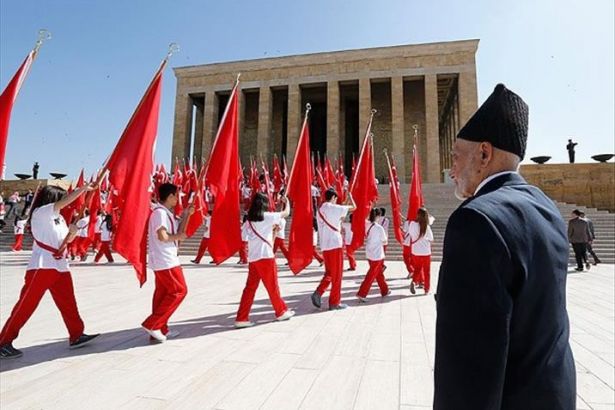Turkey celebrates May 19 in shadow of Islamist government's bans

As Turkey’s people are celebrating the 98th anniversary of May 19, 1919, which is a public holiday around the country, as a historical milestone during the War of Independence that led to the foundation of the Republic, AKP bans many commemoration ceremonies again under the pretext of “provocative attempts”.
The government banned this year’s pre-planned ceremonies in many cities and districts such as İzmir, the third largest city of Turkey, and İstanbul’s metropolitan Beşiktaş district, where the people overwhelmingly said ‘no’ to the constitutional amendments of President Recep Tayyip Erdoğan and his party during the April 16 fraudulent referendum. While the reason was explained to be provocative attempts, other cultural festivals and sports events were held in the same districts without any restrictions.
Turkey celebrated Atatürk, Youth and Sports Day on May 19. The day marks the 98th anniversary of the beginning of the Turkish War of Independence after Mustafa Kemal Atatürk, travelled from allied-occupied İstanbul to Samsun on the Black Sea coast on May 19, 1919, to launch Turkey’s War of Independence against imperialist powers.
ANTI-REPUBLICANISM AND NEO-OTTOMANISM
Recep Tayyip Erdoğan and his ruling AKP party have always shown their anti-Republican stance for the last 15 years since they came to power in 2002. Labelling the modern Republic of Turkey, which was founded in 1923 rising from the ashes of the collapsed Ottoman Empire, as a “long break” with the monarchist Ottomans, AKP has ignored the symbolic days of the Republic such as April 23, May 19, August 30 and October 29 which all left mark on Turkey’s War of Independence in the run-up to the proclamation of secular Turkey under Mustafa Kemal Atatürk.
Adhering to a Neo-Ottomanist dream in both domestic and foreign policy, Erdoğan and AKP government avoided taking part in the ceremonies of Republican commemoration days. For example, President Erdoğan and his predecessor Abdullah Gül, a founding member of AKP, did not attend official celebrations many times under the pretext of “poor health conditions” or “international meetings”.
Furthermore, the bans on the Republican days and symbols are nothing new in the country. Last year, commemorations for the Republican Day and Mustafa Kemal Atatürk’s death anniversary were banned by the governorate of Ankara. While national holidays have been the target of these bans especially in the last couple of years, the anniversary of İstanbul’s conquest was celebrated in 2016, with the participation of Erdoğan and prime minister, Yıldırım. While it was claimed that the world’s largest stage was set up for the celebration, security forces including 9 thousand policemen, 5 helicopters and 1 submarine were placed only for the celebration.
While Erdoğan sets the ideal of "New Turkey" as his utopia, he made a striking statement in April 2016 in an attempt to reinterpret the country’s history: “I reject an approach of history that starts the history of our thousands-year-old nation and civilisation almost from the year of 1919. Those who isolate our last 200 years, even our last 600 years including victories and defeats, and skips the old Turkish history and jumps to the Republic are the enemies of our nation and state.”
Erdoğan’s government attempted to replace the Republican symbols and anniversaries with such ‘festivities’ as the Ottoman’s conquer of İstanbul or the birthday celebrations of the Islamic prophet Mohammed. So much so that, the old allies, now-foes, Erdoğan and the Gülenists tried to erase the republican days while highlighting the Islamic symbols.
Even if the Erdoğan government attempts to erase the true past of Turkey, thus bans Republican commemoration ceremonies, more than a half of the society continues to resist such bans and biased implementations.
Meanwhile, the Communist Party of Turkey (TKP) made a public declaration, saluting May 19, 1919, as the beginning of Turkey’s War of Independence against imperialist armies and the collaborationist Ottomans. TKP announced that Turkey is no more independent, and the emancipation of the country can be realised only with the emancipation of the working people against imperialists, Turkey’s capitalist class and AKP as its political representative.




